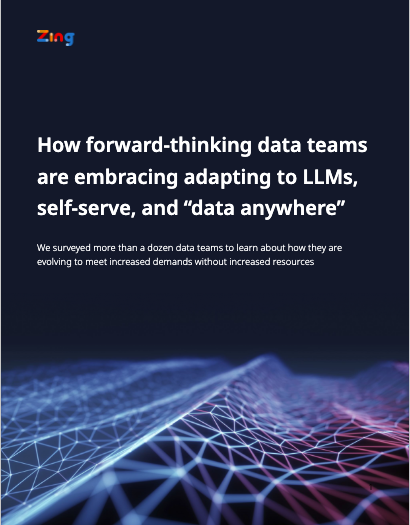As large-language models (LLMs) continue to advance and even more sophisticated AI technologies loom on the horizon, organizations are confronted with the task of effectively harnessing these tools while preserving the enduring significance and worth of their data analyst teams. These advanced AI technologies have demonstrated remarkable capabilities in natural language processing, understanding context, generating human-like text, and even performing basic data analysis tasks.

LLMs can automate certain data analysis tasks, such as data cleaning, data preprocessing, and even generating insights from raw data. They can quickly process and analyze vast amounts of information, providing valuable insights and reducing the time and effort required for manual analysis.
LLMs can also interpret and respond to natural language queries, allowing users to interact with data in a more intuitive and conversational manner. This capability simplifies the process of data exploration and enables non-technical users to access and understand complex datasets.
Furthermore, LLMs excel at understanding context and can provide valuable context for data analysis. They can interpret the meaning behind data points, identify relationships between variables, and offer explanations for trends and patterns, aiding in the interpretation and comprehension of complex data.
The natural question that emerges is: whether data analysts still have a place in an era dominated by advanced LLMs. With these models showcasing impressive capabilities in data analysis: being able to parse through enormous amounts of data and text to derive understanding and relationships; something humans are incapable of doing effectively.
However, it is vital to acknowledge that the role of data analysts has not become obsolete but has rather undergone an evolution. While LLMs can automate certain tasks and offer rapid insights, data analysts bring to the table critical thinking, contextual understanding, and domain expertise that are indispensable for comprehensive data analysis.
They possess the ability to validate, interpret, and refine the outputs generated by LLMs, ensuring the accuracy, reliability, and providing crucial context to the analysis. The synergy between LLMs and data analysts is therefore crucial for maximizing the potential of these advanced technologies while maintaining the human element essential for effective data-driven decision-making.

Organizations need to contemplate the integration of LLMs into their data workflows and reassess the tools and technologies they utilize. This entails:
Comprehending the capabilities and constraints of LLMs. For example, they can exhibit biases present in the training data, and may lack a deep understanding of domain-specific knowledge.
Pinpointing areas where data analysts can augment and enrich their analytics efforts, such as training analysts on critical thinking, domain expertise, and contextual understanding to ensure the accuracy, reliability, and ethical use of data insights generated by LLMs.
Allocating resources towards staying abreast of the latest trends and advancements in analytics, including the advancements in LLMs and related technologies.
By embracing this overarching approach, businesses can effectively navigate the evolving analytics landscape and capitalize on the synergies between LLMs and data analysts, ensuring optimal utilization of both entities. This proactive stance enables organizations to harness the potential of LLMs while leveraging the unique skills and expertise of data analysts, fostering a harmonious and productive data-driven environment.

Zing Data can help you bring data to all in your company, with the help of LLMs. If the pointers in this article resonated with you and/or your company, Schedule a demo with us to find out how we can tackle your problems.
Check out our whitepaper, which contains insights from our interviews with over a dozen data teams at Fortune 500 companies and fast-growing start-ups. We cover other challenges that these teams are tackling, and the opportunities that they have set their sights on.
Available on iOS, Android, and the web
Learn how Zing can help you and your organization collaborate with data
Schedule Demo